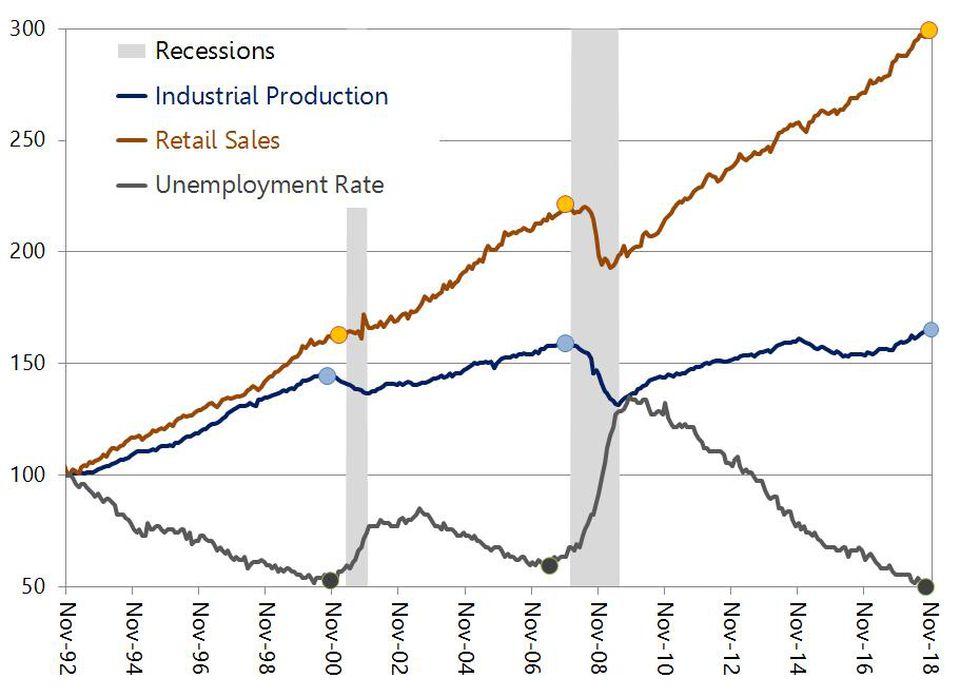Business
Recession Is Here Will Depression Follow? Sobowale Writes For gwg.ng

“All things do help the unhappy man [and nation] to fall.”
William Shakespeare, 1564-1616.
By Dele Sobowale
Even the village idiot now knows that Nigeria is an unhappy country falling everyday. Suddenly, no economic index is favourable. Unemployment is high and getting worse.
Exchange rate has remained stubbornly high; prices of goods are rising; external reserves are dwindling; Excess Crude Account, ECA, is being steadily depleted and debts are at the highest level since Dr Ngozi Okonjo-Iweala got us out of the debt trap in 2004.
On May 29, 2015, the President announced that Nigeria was generating 4000MW of power daily and he declared that it was “unacceptable”. Today, 4000MW per day had become the exception; daily power supply is now stuck at less than 3000MW.
It has taken us four years to crawl back to power generation levels last experienced in 2012. The Nigerian Stock Exchange, NSE, should by now probably consider changing its name to Nigerian Loss Exchange. It has been on the down trend for the last three years. Nothing suggests that 2019 will be different from the previous years. If anything at all, investment in the NSE will continue to decline as the remaining portfolio investors sell and move out. They really have no reason to remain.
“Investment inflow dropped by $3.2bn in Q2 – NBS”.
That was the bad news concerning the second quarter, Q2, as we move gradually into the third quarter, Q3. Nothing suggests that the result will be better in Q3 or Q4 for that matter.
One of the first lessons students reading Economics at any university learn is that decelerating investment in any economy invariably results in lower Gross Domestic Product, GDP, growth rate during the period under review and subsequent quarters until the decline is reversed. Not surprising, the GDP in the second quarter of this year dropped below that of Q1; which was also less than that of Q4 in 2018.
In Economics an economy is in recession when the GDP growth declines in two straight quarters, The Nigerian Bureau of Statistics, NBS, was playing politics by not announcing that the economy is in recession. The NBS was probably waiting for independent commentators, like Yours truly, to announce the verdict. The NBS surely knows the truth; but is reluctant to say so for fear of reprisals from a Federal Government which has lived on denials from the first day in office.
Depression Comes As A Surprise Visitor
While a recession is bad enough; it is still a milder form of economic distress than a full blown depression.
Nigeria might be heading in that direction right now. The last time there was global depression was in the 1930s. The global economic calamity brought to the fore-front of Economics the Keynesian model which was credited with eventually getting the world out of the disaster and which started a period of sustained growth led by the United States.
Pictures from that era showed ruined businessmen jumping out of multi-storey buildings to their deaths. Others shot themselves as their businesses collapsed under them. An economic depression is worse than war. At least, citizens are generally aware that a war might be getting started.
A depression catches everybody by surprise mainly because the government invariably deny the fact of imminent collapse. Measures which should be taken are delayed for political reasons until they are no longer effective and tougher prescriptions need to be imposed. Then the existence of government and the governed is seriously imperilled.
The pieces of evidence of deepening recession and possible depression are already gathering momentum and only a little bit more need be added before the Nigerian economy goes into an uncontrollable auto-pilot taking us where we don’t want.
I am aware that, like most governments, this government ignores advice. They wait until things go from minor disturbance to major crisis before acting. Even then the steps taken are seldom effective because they have been overtaken by events.
“Nigeria tragically living on borrowed time, says W’Bank.”
First of all what makes the statement most striking was the fact that it was uttered by a Senior Agriculture Economist at the World Bank, Dr Adetunji Oredipe – obviously a Nigerian. So, it is going to be almost impossible for our leaders in Abuja and the state capitals to hide behind the nonsense that the World Bank does not wish Nigeria well.
This is our son telling truth to us whether we like it or not. To be quite candid, Dr Oredipe has not gone far enough. Nigeria is not only living on borrowed time, we are living on borrowed funds and depleting economic resources.
Time is, of course, a major economic resource which is prodigiously wasted those of our leaders who take months to appoint their cabinets; take years to react to a law suit instituted against us in a foreign land and then take even more time to respond until we find ourselves with $9.6bn to pay to a foreign adventurer. They cannot understand Oredipe.
Oredipe reminded us about two examples which substantiate his alarm. They are reproduced below.
“Nigeria accounted for 42 per cent of the world’s exports of shelled groundnuts. Our total export volume was 502,000MT. This declined to 356MT by 2016. Nigeria lost her leadership position and was overtaken by the USA, China, and Argentina.
Nigeria Not Among Top 15 Palm Oil Exporters
Nigeria was also the largest exporter of palm oil in the world and accounted for 27 per cent of total global export volume for palm oil.
“Indonesia alone recorded US$16.5bn, 54.5 per cent of total palm oil exports. Unfortunately, Nigeria is not listed among the first 15 as at this moment.”
Apart from updating the statistical data, Oredipe has merely informed us that our nation is doomed on account of dependence on crude oil which is no longer capable of providing this country with the revenue required for rapid GDP growth.
Oredipe, perhaps wanting to spare us the implications of our current status as groundnut and palm oil producer did not draw the obvious conclusion. The nations now leading us in groundnut and palm oil production were once our customers. With their new position as leading producers they have become entrenched competitors.
Even if we now want to increase the output of these commodities significantly, we will face stiff competition when attempting to export our products. More to the point, we are not now even in any position to increase output of farm products for several reasons – only two of which will be mentioned now.
First, the farm workers who in the 1940s to 1970, who made Nigeria the leading exporter of palm oil, groundnut, cocoa, timber, cotton etc have been replaced by children who are not interested in farm work.
Even in the good old days, women and produced a large percentage of the food items – ably supervised by the male farmer and occasionally the male children.
Today, in Nigeria, the typical farmer is an old woman about fifty years old practising the same method of agriculture which the rest of the world discarded in the last century with the advent of the Green Revolution. The Green Revolution, itself, which allowed mankind to escape mass starvation in the bottom half of the last century has also gradually given way to biotechnology.
Between the two advances in agriculture they have made it possible to increase crop yield per hectare in advanced countries by more than forty times. The Nigerian farmer, still stuck in the Stone Age cannot compete anymore. Globalisation of markets has reached the Nigerian farm and it is making expansion of production almost a wasted effort because Nigeria cannot compete on price. That is the problem we are now experiencing with rice.
To be continued…
And For More Nigerian News Visit GWG.NG














